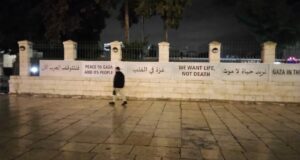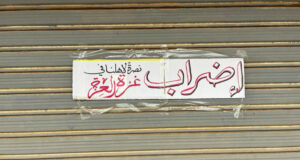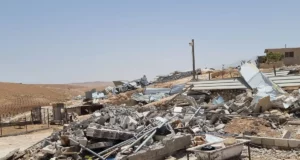by Grera Berlin. Khaleej Times, 8 June 2006
The little girl clung to my hand, her backpack falling down one arm as she tried to climb the steep stairs on her way to school. She was dressed in a checked uniform with a grey hijab pushed to the back of her head, her shiny black hair peaking out the front. She was scared. At the bottom of the steps were two Israeli police vans, a jeep and several soldiers standing around watching.
On a good day when we escort the children, we are met with just swear words as the settler children march down to their school across the road from the Palestinian girl’s school. Their parents walk them to school with Uzis strapped across their chests, a civilian terrorist squad whose presence has made many of the original owners, the Palestinians, leave.
In September 2005, I was part of a human rights group that stays in the Tel Rumeida district of Hebron to make sure Israeli settlers don’t injure and kill Palestinians. Since Israel refuses to allow UN peacekeepers in to monitor settler behaviour, we are it. We mostly are a part of organisations such as Christian Peacekeeping Team (CPT), and the International Solidarity Movement (ISM).
About 450 illegal settlers live in this small area of Hebron, guarded by 3,000 soldiers and police, and surrounded by 130,000 Palestinians. They come from a fanatic orthodox sect in Brooklyn, and have made the lives of Palestinians miserable. The once-bustling market on Shuhada street is a ghost town. Raw sewage seeps from the settler apartments above into the streets. The smell as we walk through the winding streets is overwhelmingly vile, yet Palestinian merchants try their best to open their few remaining shops. Settlers have spray-painted huge stars of David on many of the doors and windows along with epithets in Hebrew and English.
Over the tops of our heads stretches wire netting filled with used baby diapers, food wrappings and broken furniture that these settlers have thrown from their windows. The merchants shrug their shoulders and whisper, “What can we do? Inshallah! No one cares.” The first day I arrived was Saturday, September 2, the day most settlers run rampant over everyone; we were told to immediately go to the top of the hill that separates settlers from Palestinians.
Within a half hour, settler boys between 10-17 came strutting down the road toward the small Palestinian children playing in front of us. We turned on our cameras as they advanced. The older boys encouraged the younger ones to pick up stones and throw them at us. Stones came flying through the air, hitting me in the hand and thigh. Two soldiers — who had been standing there watching — finally called the police.
I started up the hill after them, only to be pulled back by the soldier who said, “I’m sorry, but they get very upset when they see a camera. You need to put it away.”
“Put it away? Not on your life. You think I’m going to let them get away with throwing stones at two women who were sitting there doing nothing?”
“I know, I know, but there’s nothing we can do about it. They’re under 12 years old.”
These kids began a full-on riot, throwing stones at the police and army, throwing pipes off the top of their settler apartment at homes beneath them, screaming obscenities, throwing garbage and flashing mirrors in the faces of the soldiers. Little settler girls started to come down and throw stones. As I stood watching, an old woman marched up to me and spit, “God will get even with you. You will be killed for this. This is our land, it doesn’t belong to these Arabs.” I clinched my teeth and didn’t respond, because the Israeli military is just looking for a reason to drive us out.
The next day, a Palestinian teacher called us and asked us to come to his home. The settlers had come in a month before, and had cut through every grapevine that he had, vines that were over 100 years old, thick as my thigh. When he called the army, they had come in and said, “Go back in your house or we’ll kill you.” He had no choice, and every single vine was cut in half. He took us out and pointed at one in the back of his house. “Look. That one has a shoot growing already. They’ll come back someday.”
My God, what could any of us say? We bear witness to the ongoing destruction of Palestinian society, and no one cares. Palestinians look at us with despair, asking us why the Western governments do nothing as Israel commits slow-motion genocide against them. What can I say or do except continue to bear witness and continue to write.
 International Solidarity Movement Nonviolence. Justice. Freedom.
International Solidarity Movement Nonviolence. Justice. Freedom.


